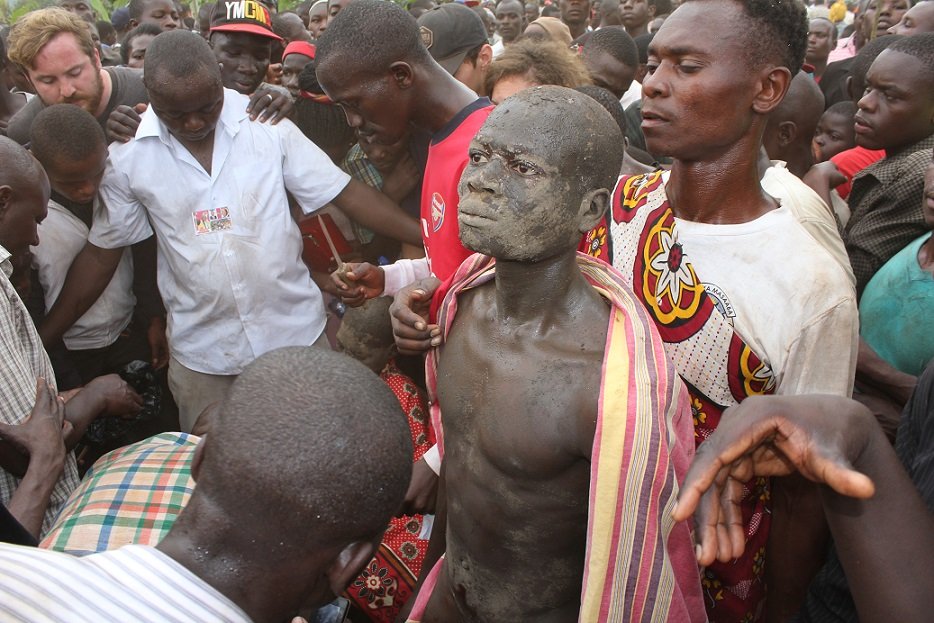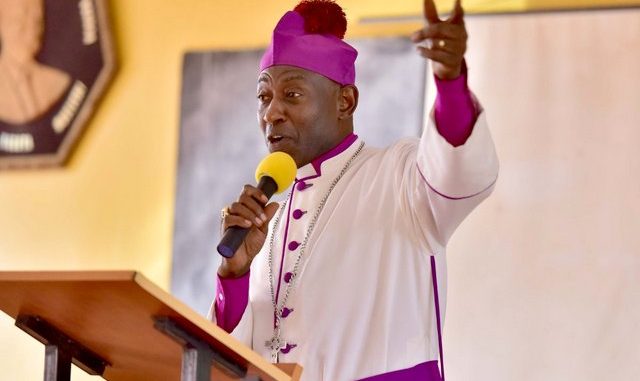(Mbale) – The Bamasaba’s claim to fame may not be the coffee or the towering Mount Elgon, but rather a ritual that sends shivers down the spines of the uninitiated: Imbalu. It is a biennial event that guarantees an emotional rollercoaster, not just for the young lads being circumcised, but for their entire community. From Mbale to Bududa, everyone knows that when the horns of Tsingombi and Tsimbebe sound, it’s time for some serious dancing and, of course, the inevitable snip snip.
Imbalu is no joke—ask any Bamasaba elder and they will tell you it is the ultimate test of bravery. Not even the bravest man in a Ugandan village would dare blink, twitch, or—heaven forbid—shed a tear. According to Gerald Wafana, a clan elder, “This is not just a circumcision; this is how a boy proves he is a man.” And to all the young lads facing the knife, there’s one rule: Don’t flinch, not even a little bit, or you might as well pack your bags and head out of town. In Masabaland, if you so much as wince, you are going to be the punchline at every village gathering from now until eternity.
There’s even a whole lexicon for those who “don’t make the cut” in the metaphorical sense. The Basinde, or uncircumcised boys, are as respected as a chicken at a wedding. They get no love from the ladies, no respect from the men, and let’s just say the family gatherings get a bit awkward. It’s a whole lot better to face the knife with pride and stoicism than live a life dodging side eye from your own grandmother.
| Step | Description |
|---|---|
| Khushebusa | Blowing of horns to announce the start of Imbalu |
| Khuwentsa Imbalu | Village dances where boys announce their intent to face the cut |
| Khukhwingila Imbalu | The actual circumcision ceremony, aka the moment of truth |
| Khukhuyalula | Post-circumcision ritual where initiates burn banana leaves and officially enter adulthood |
The Dance Before the Cut
As soon as a Bamasaba boy decides he’s ready to cross the line into manhood, it’s all about Khuwentsa Imbalu—the village tour where the initiate dances to show he’s got the guts. You’ll see young boys, decked out in flamboyant regalia that would make even the best dressed Kampala folks jealous. Beads across the chest, metal bells on their thighs, and a tail made of cowrie shells hanging from their backs—this is not just a dance, it’s a declaration of bravery.
These boys don’t dance for fun. This is their final act of boyhood before they face the cut. And they don’t just dance in their own villages either; they go from village to village, stomping their feet and announcing their courage for all to see. Picture a traditional marriage ceremony where everyone waits to see if the bride will cry—now, replace the bride with a boy, the altar with a surgeon’s knife.
The Mythical Origins of Imbalu
It all supposedly began with a Kalenjin woman, Nabarwa, who wouldn’t marry Masaba, the patriarch of the Bamasaba, until he got circumcised. From then on, the Bamasaba have never looked back. Every even year, the horns of Tsingombi blow, and the lads of Bugisu prepare for their turn under the knife.
This year, the Imbalu ceremony was graced by not just local royalty, but kings from Ghana and Nigeria. It was almost like Uganda’s version of the African Union, with drums, horns, and dances that made sure no one forgot the seriousness of the event. With so much pomp, you’d think you were at a state dinner, but this is the Bamasaba’s way of ensuring that their sons turn into men, and men turn into legends.
Before the grand day, there’s a whole ceremony of millet threshing, chicken sacrificing, and beer brewing. The local beer, Busera, plays a huge part in this rite. It is like a “cheers to bravery” before the initiate goes under the knife.
When the actual day of circumcision, Kumululilo, rolls around, there’s no turning back. The lads, coated in millet yeast dough, march to the Bashebi (the surgeons), armed with nothing but their bravery. The cut is quick, but the silence is deafening. No flinching, no twitching, and definitely no crying. It’s like the village is holding its breath, waiting for the whistle that signals it’s all over.
Dispelling the Myths: No Girls for the Night
One myth that needs busting, according to elder Makhafu Kuloba, is the idea that initiates get a girl to spend the night with before circumcision. That may have been true in the past, but things have changed. In today’s Masabaland, it’s all about the bravery and the cultural legacy, not about any pre circumcision shenanigans.
From Pain to Gain: The Role of Imbalu in Tourism
Believe it or not, Imbalu has even turned into a tourist attraction. Every August, people from all over the world gather at Mutoto, the site where the first circumcision took place, to witness this ancient tradition. There are plans to turn Mutoto into a full fledged cultural museum.
Imbalu is more than just a rite of passage. It is a testament to the strength, resilience, and cultural pride of the Bamasaba people.




















